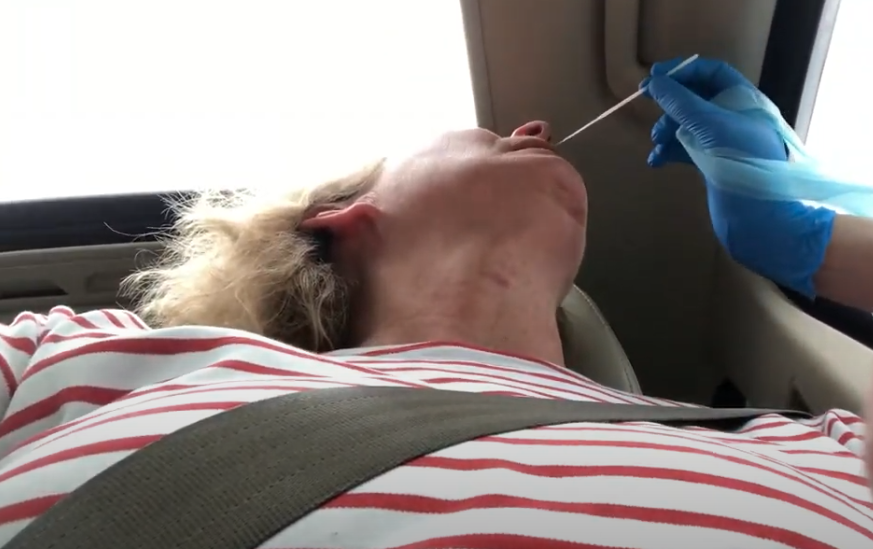Editor’s note: There wasn’t any information in the report about the New Hampshire press corps’ valiant efforts to get the facts out to the people, many who like InDepthNH.org’s Paula Tracy attended all of the press conferences and got back to covering the legislature early on where there were known cases of COVID-19 and no formal reporting system to let citizens know who was infected unless the lawmaker made their case public. Here’s a video of Paula Tracy taking a COVID-19 test in June of 2020. I’m proud of all of the reporters in NH who went beyond the press conferences to make sure the people of New Hampshire were well-informed.
Selfie video above shows InDepthNH.org’s senior writer Paula Tracy getting a COVID-19 test.
By PAULA TRACY, InDepthNH.org
CONCORD – Beginning in March of 2020, New Hampshire lost almost 3,000 of its 1.4 million residents to the highly transmissible respiratory disease COVID-19 during an unprecedented international public health crisis with more than 375,000 cases reported in the state.
A third-party consultant looked at New Hampshire’s response to the COVID-19 pandemic and gave it high marks, but also laid out a list of areas for improvement to respond to the next crisis, when and if it occurs.
State departments are now looking at the document produced in consultation with Tidal Basin Government Consulting LLC of Utica, NY. https://www.tidalbasingroup.com//
Gov. Chris Sununu, who is not running for re-election and the Republican who was at the helm during the entire crisis, issued the report on Monday.
A copy of it is here https://www.governor.nh.gov/sites/g/files/ehbemt336/files/inline-documents/covid-19-report.pdf
The consultants conducted a number of surveys with state agencies, municipal officials, private and nonprofit groups with the hope of creating a document which would be “an important tool” to guide future preparedness.
Their responses, observations and recommendations form the body of the report.
It found respondents to their questions generally believed the state did a good job of establishing a “delicate balance between public health and economic stability” and that it had strong leadership, but respondents also noted at times that the state suffered from a lack of electronic vaccine data, which was being developed and late compared to most states which already had that.
Also, they found that there were particularly at the beginning command situations which forced leaders to navigate through complexity and ambiguity, privacy concerns for health data that made it difficult and potentially dangerous for public safety officers to respond and also, information from press conferences did not filter down within certain agencies and departments.
It recommended more training, collaboration among departments, a better understanding of roles and other public and private agencies.
It suggested each state department have a public information officer established and that in emergencies, some information be released to them ahead of press conferences.
Sununu and his unified command strategy with health officials, National Guard and emergency services, has been largely praised for his efforts at communication and transparency, and that held up in the report.
Between March 13, 2020 when he declared a public health emergency, shuttering businesses, schools and until many of the emergency orders were lifted 16 months later, Sununu conducted a total 111 press conferences. State call centers would get deluged with as many as 211 million calls made, many after press conferences were held.
And in some cases, the report said, the information was not yet available to the call centers.
The study broke down responses to categories such as logistics, public information dissemination, health and medical data, compliance and decision making, financial management and communications.
In most cases, the report has recommendations for improvement which include building a more resilient system (for example, the Department of Employment Security went from about 4,000 unemployment applications a week to 120,000) to deal with a scale and scope needed for a response.
It called on the state’s Health and Human Services department to continue to invest in its electronic registry of immunizations, which have been thwarted by private citizens and groups who are concerned about exposing private information to the federal government or anyone.
Additionally, “Privacy considerations about reported cases complicated work for public health,” workers to do their jobs.
State department heads and other agencies will likely pore over the report to develop and implement recommendations and may include them as the state works toward the next biennial budget.
Sununu said the report finds that “New Hampshire repeatedly demonstrated strong leadership and sound judgment when coordinating resources, implementing policies, and communicating with the public.”
The governor said the state’s approach “was heralded for our groundbreaking vaccine and testing distribution, reopening guidelines that put stakeholders in the driver’s seat, supporting our small businesses, and getting kids back in the classroom…New Hampshire’s success is not because of the government, it’s because of countless individuals across the community who came together in our response and recovery. To every Granite Stater, I say thank you.”
The emergency declaration was over June 17, 2021 about sixteen months after it started in which time he issued 90 emergency orders and 28 executive orders some of which which kept people in their homes, only able to go out for groceries and emergencies. There were mask mandates and school closures and an easing of them as hospital capacity went down and vaccines rolled out in early 2021.
“Throughout the pandemic, New Hampshire demonstrated leadership, forethought, and consistency to support the 1.4 million residents of the state. Its leaders swiftly adapted to the evolving situation, positioning the state well for stronger collaborative efforts moving forward,” the report found.
“New Hampshire orchestrated state-led vaccination clinics on a scope and scale never seen before” and was creative in using a motor speedway, with help from private, philanthropic individuals and groups from the New England Patriots to Dean Kamen.





